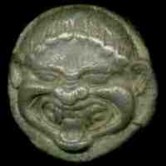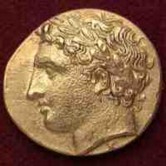
Gorgon's head on a
silver
coin of Naples
permission to use
image granted
|
CLA 300:
Dreams, Omens and
Portents
Spring 2005
|

The god Apollo on a
gold coin
of Syracuse
image courtesy of Edgar
L. Owen, #3803
|
Instructor: Dr. Victor A. Leuci
Link: Web
resources for Greek Civilization
Texts:
- Print:
- Naphtali Lewis , The
Interpretation of Dreams & Portents in Antiquity
- Electronic or on
reserve:
- Artemidorus, The
Interpretation of Dreams
- Aelius Aristides, The Sacred
Tales
- Lucian. Alexander of Abonoutichos
- Aristotle, On Dreams and On Prophesying by Dreams
- Selected
passages from Greek & Latin literature (e.g. works of Homer,
Aeschylus, Herodotus, Thucydides, Virgil, Livy, Tacitus, Suetonius)
- Cures by means of
dreams at temples of Asclepius (web article)
Objectives: This
course will examine, from a multi-disciplinary perspective, dreams,
omens, and portents from the ancient world to see the role they played
in individuals and communities lives and the role they played in
literature along with the discussion in the ancient world of to what
extent and whether any of these omens, etc. were authentic and
accurate. This course will also expect the students to understand and
apply, in a critical fashion, pertinent scholarship from various
scholarly fields to the ancient (and modern) material. With the
explosive growth of "Charismatic" or "Pentecostal" churches within the
US and abroad and with the rise or reemergence of other religious
groups, churches, movements, etc. which employ or stress dreams, omens,
and portents (e.g. visions/prophecies), the students will "form
intelligent judgements about and rational responses to" a "complex
issue, problem, or concern they will confront as citizens in the 21st
century" (New Foundations Document, p. 21)
Relationship to the General Education
Curriculum:
CLA 300A/REL 300B, Omens, Dreams and Portents, satisfies the Tier
III
requirement. The course does so in the following ways:
- When appropriate and
feasible,
professors from other disciplines (e.g. Sociology,
Religion/Anthropology, Philosophy, ) will
be asked to participate.
- Selected readings
from
various
disciplines will be required for all (e.g. Sociology,
Religion/Anthropology, Philosophy, Psychology)
- Additional selected
readings from
various disciplines will be required for the individual student
projects
& presentations
- Class discussion
based
on the
selected interdisciplinary readings and student presentations will
facilitate
student understanding and comprehension of these various disciplines
and
the value they bring to the plays themselves and their role within
society—both the Greco-Roman and 21st century.
- Prerequisite: one of the following: LAT 101, LAT
102, LAT 203, GRE 101, GRE 102, CLA 215, CLA 227, CLA 228, REL
101, REL 102, PHI 101, PHI 102, PHI 221, SCA 111, SCA 115, PSY 112, PSY
113
Format: The
course
will consist of discussion, student presentations and some lectures.
The
class may occasionally be divided into small groups to treat discussion
topics that will most often be based on readings from ancient
authors.
Grading:
- Research Paper:
2
total,
each worth 100 points; each 1800-3000 words in length (or, with
approval of the instructor, one paper
worth 200 points, 3600-6000 words in length, may be done instead) due
during the 7th and 12th weeks of the semester
- Final Paper: 50 points;
1200-1800
words in length
- Critical
Summaries:
2-3 total;
each worth 30 points; each 600-900 words in length (typically one per
unit)
- Presentations: 3-5 total;
each worth
20 points; based on critical summaries and research paper(s) (typically
presented when the critical summaries/papers are due)
- Class
Participation:
50
points; will also include posts in class discussion folder
Honor Code: All
students and faculty must adhere to the Honor Code; please see the
Student
Life Handbook for the full description of the Honor Code--p. 21
in
the Student Life Handbook gives a short definition: "No Westminster
student
shall commit any act of academic dishonesty in order to advance her or
his own academic performance, or to impede or advance the academic
progress
of others," but the sections on plagiarism and cheating are especially
important (see Honor Commission Constitution, Article IX).
ADA Accommodation: Any
student who feels that he or she may need an accommodation based on the
impact of a disability should contact me to arrange an appointment as
soon
as possible. At that time, we can discuss the course format,
anticipate
your needs, and explore possible accommodations.
Writing-Intensive
Option:
Different
types of writing will be part of the course: critical summaries,
research
papers, and a final. All papers/critical summaries will be assigned as
a means to help participants come to a better understanding,
evaluation,
and integration of important themes, ideas, and concepts. The first
critical
summary will be revised on the basis of a conference with me. One of
the
papers must be revised on the basis of conferences with me and with a
tutor
at the Writing Lab. One other writing assignments (chosen from
the
other critical summaries and papers) must be revised on the basis of
conferences
with me and with a tutor of the Writing Lab. A critique and conference
after the completion of a writing assignment may also occur. In
general,
participants in the class should highly consider using the services of
the Writing Lab and especially the Lab tutors, who can be of tremendous
assistance.
Papers:
- Content: The
critical summaries should be a "critical" summary, i.e. it should
summarize the key points and present some of the key evidence of the
material as well as provide a critique of the material. The research
paper(s) should make appropriate use of primary and secondary evidence
to address the topic chosen.
- Formatting:
- Header:
start
with a simple
heading at the top of the page giving your name, course number, a word
count, etc.
- Title of a critical summary: should be the
full bibliographic entry for the material covered
- Citations:
for
citations
follow a standard format such as the APA, MLA, etc, but note that
I prefer italicizing titles, etc. to underlining. There will be a post
in the discussion folder with examples for your aid.
- Spacing &
Font: you
may use any font, point size, or line spacing that you want--within
reason,
that is.
- Submission: A
paper copy
is due at the beginning of the class period. An electronic copy of each
paper is also required and should be submitted within 24 hours of the
due
date for the paper copy; note that there is a two letter grade
deduction
for failure to submit an electronic copy.
Attendance:
Regular attendance and participation are essential for the success of
the
whole class. More than two unexcused absences will be considered
excessive, and no make-up work will be accepted for unexcused absences.
Each unexcused absence past two will result in a deduction of 7.5
points
from the total number of points one has at the end of the semester. If
you are ill, e-mail me before class, if possible, or as soon as you are
able.
Assignments:
In
each unit, the assignments and the specific due dates are not
"set-in-stone,"
and may vary depending on how each class period goes. The syllabus will
be updated as needed.
Unit I: Ancient Theory with some
application
- Reading assignments (click here--Id
& password needed)
- Lucian's Alexander
of Abonoutichos
- Artemidorus
- Aristotle
- selections from N.
Lewis
- selected reading
related to guest lectures
Unit II: First-hand accounts
- Reading assignments (click here--Id
& password needed)
- Aelius Aristides
- cure tablets and
curse tablets
- Alexander of
Abonoutichos, again
- selections from N.
Lewis
- omens, dreams and
portents in the Old and/or New Testament
- selected reading
related to guest lectures
Unit III: Omens, dreams and portents in
literature
- Reading assignments (click here--Id
& password needed):
- Greek literature
(selections from Homer, Aeschylus, Herodotus, Thucydides, and possibly
others)
- Latin literature
(selections from Virgil, Livy, Tacitus, Suetonius, and possibly others)



